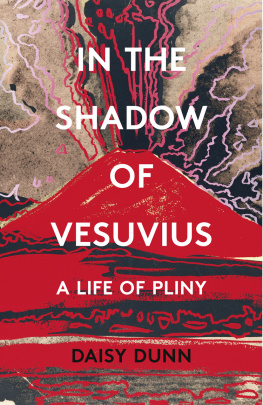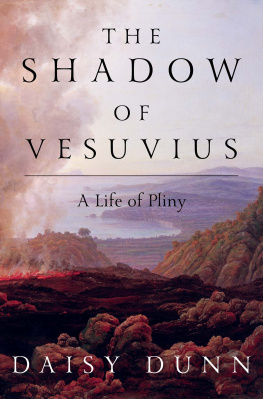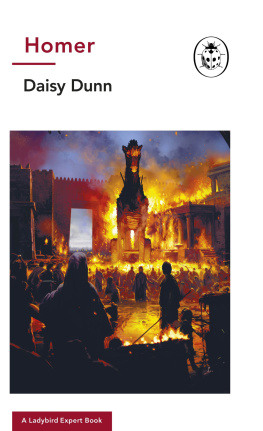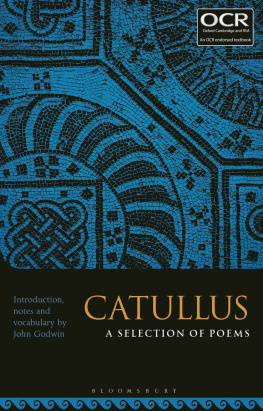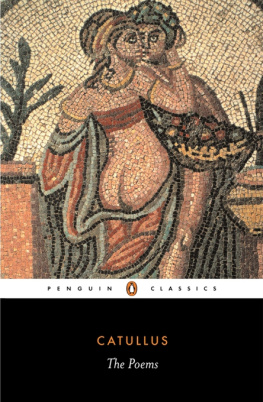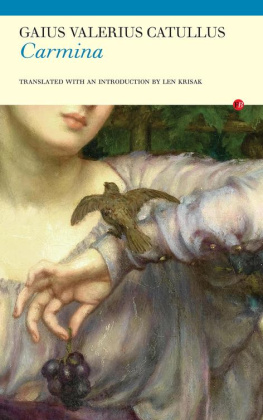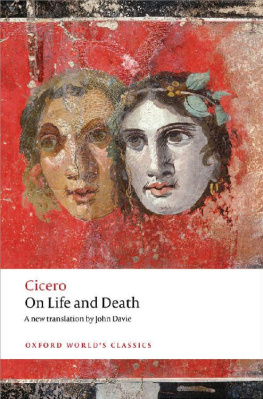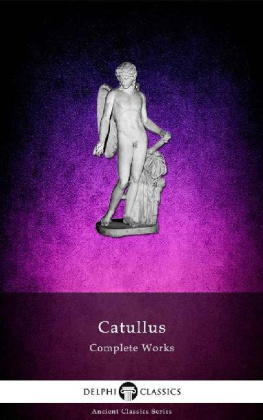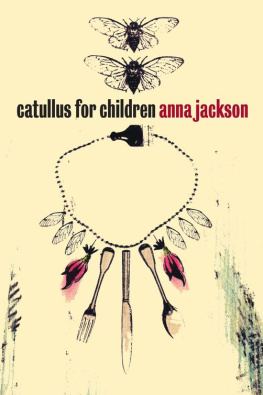CONTENTS

Poem 64
Catullus Bedspread Poem
They say that pines were born long ago
From the head of Mount Pelion in Thessaly
And swam the sea, its undulating waves
To Phasis, pheasant river, and
The land of Aeetes the king
As young men, plucked from the
Flower of Greek youth in a mission
To steal the golden fleece
Of Colchis
Dared to skim with speeding stern
The salt sea,
Sweeping turquoise waters
With oars upturned like hands.
Divine Minerva, her keep a citadel
In the citys heights
Streamlined the flying chariot to the breeze
Herself, weaving, joining the pines together
To form a curving keel.
She, the ship, inured the innocent sea
To the flight of ships.
No sooner had she torn the capricious membrane
With her beak and with a twist of the oar
Turned the waters white with foam
Than from the whitening whirlpool there emerged
The unpainted faces
Of nymphs glistening in brine and gazing
In wonder at so novel a contraption.
On that day and no other men
Watched keen-eyed they were human
The naked bodies of nymphs
Rise until their breasts were free of the eddying white.
Then Peleus is said to have burned in love for Thetis.
Then nymph Thetis did not disparage a wedding to a mortal.
Then father Jupiter himself felt that Peleus ought
To be joined to Thetis in matrimony.
Heroes, born in the moment most admired
Beyond measure of all Ages, godly race,
Offspring of a noble mother,
Again and again I beseech you.
I shall commemorate you often in my poem,
Especially you Peleus, stalwart of Thessaly,
Raised to the stars by so prosperous a match. For Jupiter,
Jupiter, father of the gods, gave up his love to you.
Did nymph Thetis bewitch you with her beauty?
Did Tethys truly allow you to wed her grand-daughter
And Ocean, too, her husband
Who envelops the whole world in sea?
Dawn came in a moment many times imagined and
All Thessaly flocked to her home as one.
The palace was filled
With the jubilant crowd who held gifts before their faces
And faces expressing joy.
Cieros was deserted, Phthian Tempe left behind,
The houses of Crannon, the walls of Larisa, empty;
They convened at Pharsalus, to Pharsalus and its homes
They flocked. No one tended the fields. The necks
Of bullocks grew soft through inactivity,
No curved scythe cleansed the soil beneath the vine,
No bull stooped beneath the yoke to cleave the earth,
No hook pruned the shade from the leaves of the trees,
Decay and rust overran the abandoned ploughshares.
But the house receded every which way
In regal opulence, and sparkled and glimmered
With gold and silver.
Ivory glinted off thrones, cups dazzled off tables,
The whole household delighted in the lustre of
Royal treasure.
Observe the couch at the heart of the palace,
A fine seat for a goddess,
Finished with ivory from India
And spread with purple tinged with the rose-pink
Dye of the murex fish.
This bedspread,
Embroidered with the shapes of men
Who lived long ago, unveils the virtues of heroes
Through the miracle of art.
Looking out from it
On the quietly shifting shore of Naxos
Ariadne watches Theseus
Fading with fast fleet and bears at heart
Fears she cannot temper.
Not yet does she believe she is seeing
What she is seeing,
Barely woken from sleep that deceived
To discover she is abandoned
And pitiful and alone on lonely sands.
But the young man is forgetful and fleeing
And pushes the waves away with oars,
Leaving his promises unfulfilled to the tempest that is stirring.
From afar atop the seaweed, with sad little eyes,
The daughter of Minos watches, ah she watches,
Him, like a stone sculpture of a bacchant.
She ebbs on currents swollen with pain,
Losing hold
On the fine band on her fair head
And the cloth that envelops her body in a gentle clinch
And the rounded bra that bounds her milky breasts.
All the coverings which have fallen from her body everywhere
The salt waves make sport of at her feet.
But neither headband nor fluttering veils vexed her
When in the fullness of her heart
She was missing you, Theseus,
With her every thought, in the fullness of her heart
Clinging to you, completely lost.
Poor girl, how Venus felled her with never-ending grief,
Sowing thorny worries in her heart
From the moment Theseus determined
A departure from the port of Piraeus on Athens arced shore
And reached the palace of the unjust king of Crete.
For they say that Athens, plagued by damnation
To pay the penalty for the murder of Androgeos,
Would at one time provide its pick of youths
And glory of maidens as a feast for the Minotaur.
The fledgling city was suffering the consequences
When Theseus chose to yield his own body
For precious Athens so the living dead of Cecrops
Should not be carried to such deaths in Crete.
And so he put his trust in a light ship and gentle breeze
And came before haughty Minos
And his magnificent enclosure.
The moment the virgin princess clapped her
Widening eyes upon him
Her pure little bed was still protecting her in a soft
And motherly embrace, breathing sweetly
Over her the fragrant breath
Of myrtle such as the River Eurotas puts forth
Or the breeze spring plucks from flowers of many colours
And averted her hot eyes from him only when
Her whole body had caught the flame of love
And she burned deep inside to the depths of her marrow.
Wretchedly rousing passions in his cruel heart,
Divine Cupid, weaver of joys with worries among men,
And Venus, ruler of the Golgians and leafy Idalium.
On what waves you inflamed the girl, threw her
From her wits, as she sighed for her fair guest
With breath upon breath.
How huge the fears she carried in her wearied heart.
How many times she paled beyond gleaming gold,
When putting his mind to conquering the savage monster
Theseus sought either death or the fruits of glory.
Promising little gifts to the gods that were not unwelcome
But futile nonetheless, she mouthed vows silently.
Like an oak tree or cone-bearing pine with seeping bark
Shaking its branches on the heights of Mount Taurus
Whose twisting trunk a storm uproots in a flash
And the tree, torn from the roots,
Falls prostrate and far
Breaking whatever lies in its broad path
So Theseus laid the beast low, conquering its force
While it tossed its horns ineffectually to the empty breeze.
From there and high on glory the stranger retraced his path,
Steering his wandering course with the delicate thread
So the deception of the enclosure should not defeat him
As he departed from meandering turns of the labyrinth.
But come, I digress from my primary song,
Recollecting further how the girl departed
From the face of her father, the embrace of her sister,
And finally her mother, who tried wretchedly
To feel happy for her lost daughter, who put above
Them all her sweet love for Theseus;
Next page

